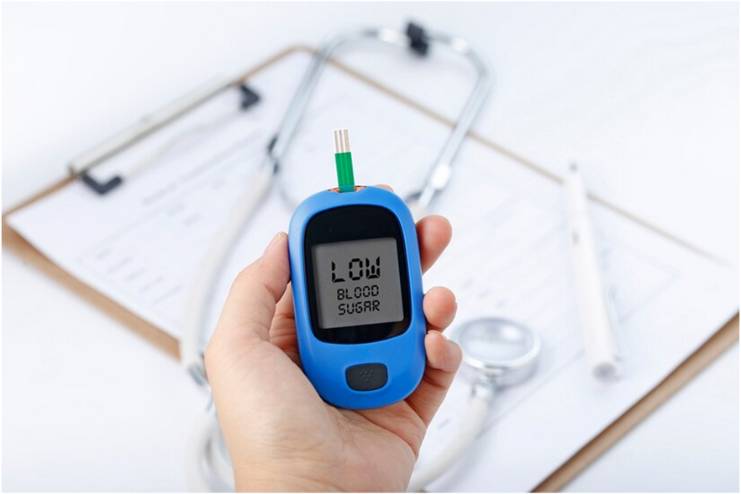Affiliate Disclaimer
Some links in this article are affiliate links. We may earn a small commission if you make a purchase through these links, at no extra cost to you. We only recommend products we find useful to our readersStress is a part of life, both for the mind and the body. It is generally associated with negative effects on one’s mental health, but did you know that stress also has a significant impact on physical health?
Whenever we experience stress, our body responds with a “fight or flight” response. This results in our hormones and systems working overtime as they attempt to cope with the cause of stress.
Stress can also affect how the body treats glucose and the risk of diabetes. Chronic stress interferes with the way glucose is processed in our bodies, thus leading to high sugar levels in the bloodstream and, therefore, increasing the risk of developing diabetes.
In this article, we will explore how stress influences glucose absorption and the risk of developing diabetes. We will examine how emotions affect our body processes and how to manage our stress levels to stay healthy practically.
The Stress Response and Its Impact on Glucose

The “fight or flight” phase has been part of human evolution for centuries and is a natural survival mechanism that the central nervous system triggers. This causes several physiological changes so that we can face the stress factor.
One of the major players in this response is the autonomic nervous system. It is comprised of two divisions: sympathetic and parasympathetic.
When we’re under stress, sympathetic nervous activity is increased. It drives up heart rate, increases blood flow to our muscles, and pumps glucose from storage into the bloodstream to give us that quick energy flow. This is very useful in the short term but problematic if our stress is chronic.
Stress also affects the neuroendocrine system, which includes the hypothalamus, pituitary, and adrenal glands. Upon experiencing stress, the hypothalamus releases a hormone called corticotropin-releasing factor, or CRF. It stimulates the pituitary gland to produce adrenocorticotropic hormone, or ACTH, which then sends signals to the adrenal glands, making them release cortisol in our body.
Cortisol helps manage how much of our body’s carbohydrates, fats, and proteins we utilize, and excessive cortisol levels are directly proportional to increased blood sugar levels.
Lastly, stress interferes with the immune system. Stress can affect how the immune cells work, thus affecting the way our body handles glucose. Severe stress will, therefore, lead to a long-term rise in blood sugars, which increases the risk of diabetes.
1. Stress and Glycemic Control

Stress can make it harder to manage diabetes and control blood sugar levels. Here’s how:
- Difficulty with Daily Diabetes Care: While under stress, one may find it difficult to follow the habit of diabetes care. This care encompasses blood glucose monitoring, meal planning, and medication management. Stress may deny you some memories or even deny you remembering to carry out these important measures, leading to poor blood sugar control.
- Diabetes as a Source of Additional Stress: Ironically, in some cases, the management of diabetes itself could be a source of additional stress. Maintaining a strict diet or trying to keep up with medication schedules can be overwhelming during times of stress.
- Impact on Glucose Levels: Stressing out triggers the release of hormones such as cortisol in the body. These hormones increase blood sugar levels because they keep prompting your body to release more glucose in the blood to provide the needed energy to respond to the stress factor. This may work for a while; however, chronic stress can lead to high blood sugar levels.
How Stress Impacts Long-Term Diabetes Risk

Stress’s impact extends beyond short-term effects on blood sugar levels and may influence long-run development or exacerbation of diabetes. Here is how:
- Chronic Stress and Diabetes Risk: Chronic stress leads to prolonged elevation of cortisol in the body, affecting glucose metabolism. This can eventually lead to insulin resistance or the failure of cells in your body to respond to the action of insulin. Insulin resistance is among the most significant cause for conditions like type 2 diabetes.
- Influence on Lifestyle Choices: Stress increases the risk of diabetes in ways that affect lifestyle choices. For example, people under stress might opt to consume more comfort food that is unhealthy for them, ignore some form of physical exercise, or even abandon the regimen recommended for diabetics. All these increase blood sugar levels and diabetes.
- Immune System and Inflammation: Chronic stress also affects your immune system and increases levels of inflammation in the body. This increase may lead to complications and exacerbate the risk of diabetes. Inflammation is somehow related to insulin resistance; therefore, it becomes hard to handle diabetes.
Practical Strategies for Managing Stress and Reducing Diabetes Risk

Proper stress management is critical for effectively controlling your blood sugar and also in cutting the chances of getting diabetes. Here are some concrete ways you can manage stress for better diabetes control:
- Develop a Stress-Reduction Routine: A daily schedule that incorporates stress-reduction activities is a pretty good way to keep your stress level at bay. Some activities include exercise, meditation, deep breathing, and yoga. In this manner, you not only reduce stress but also keep yourself fit.
- Set Realistic Goals: This often helps reduce stress. Specific, measurable goals, such as “I will walk for 20 minutes each day” or “I will eat a healthy breakfast every morning,” should be included in your goals for diabetes management. Split big goals into smaller ones to make them more achievable.
- Practice Mindful Eating: Stress usually leads to poor eating habits and affects blood sugar levels. Mindful eating is the process in which you focus entirely on your food and the process of eating it. Try to eat slowly and enjoy your meals. Avoid getting distracted by the TV or working while having dinner. This will lead you to make healthier choices regarding food and keep the portion size under control.
- Monitor Your Stress and Blood Sugar Levels: Track your stress levels and how that impacts your blood sugar. Stress diaries or apps can help manage your stress levels and observe any trends of changes in your blood sugar reports.
- Get Regular Exercise: Do anything that you enjoy, such as swimming, cycling, or walking. Exercise helps reduce stress hormones, improves mood, and stabilizes blood sugar. Exercise at least 30 minutes most days of the week.
- Stay Hydrated: Drink plenty of water throughout the day. Hydration is an important determinant of overall health and helps maintain stable blood sugar levels.
- Get Adequate Sleep: Get at least 7-9 hours of sleep every night. Maintaining good sleep hygiene has been shown to decrease stress and improve the self-management of diabetes. Try to get on a regular sleep schedule and have a pleasant bedtime routine.
- Avoid Stress Triggers: Identify activities or circumstances that trigger stress and develop a plan to regulate them. For example, if there is stress at the workplace, you could negotiate possible changes with your employer or find ways of optimizing the workload.
- Engage in Enjoyable Activities: Spend time doing things that make you happy and relaxed. Activities that you enjoy may bring positive diversion from sources of stress and will. Try painting, gardening, or hiking. Sign up for an art or pottery class.
- Practice Positive Self-Talk: Replace negative thoughts with positive affirmations. Appreciate and reward yourself for how you have been managing diabetes when trying to deal with problems.
- Seek Social Support: Interact with people close to you, such as friends and family members or even with people who have undergone this challenge. Talking to them helps diminish the feeling of being overwhelmed.
Conclusion
Stress plays a huge role in glucose absorption and impacts diabetes management. The physiological responses to stress in the human body have made clear why controlling stress is essential for stable levels of blood sugar and overall health. From glucose metabolism to its effects on hormone levels and immune systems, stress can complicate diabetes management and increase a patient’s susceptibility to complications.
Adding practical strategies to one’s daily routine helps keep stress in check and its influence on diabetes at a better-controlled level. A structured routine, healthy eating with regular exercise, and various techniques to reduce stress keep stress levels under control. Hydration, plenty of sleep, and availing of social support also play a significant role in controlling stress.
References
- https://www.ncbi.nlm.nih.gov/pmc/articles/PMC9561544/
- https://www.ncbi.nlm.nih.gov/pmc/articles/PMC9360912/
- https://www.sciencedirect.com/science/article/pii/S0091302221000741
- https://karger.com/hrp/article/96/1/34/841550/Stress-and-Diabetes-Mellitus-Pathogenetic
- https://diabetesjournals.org/spectrum/article/18/2/121/1827/Stress-and-Diabetes-A-Review-of-the-Links
In this Article


















